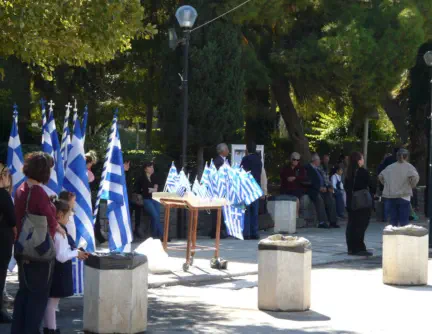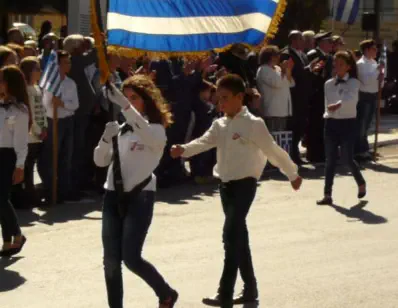On the 28th of October, Greece and Greek communities around the world celebrate one of the nation’s most important holidays – the “Ochi Day” (“No day”).
The Greeks said “no” to fascism and refused to accept compromises, fighting for their values and showing ultimate bravery.
Back in 1940, Benito Mussolini saw Greece as an easy victory that would strengthen Italy’s position in the political arena and prove their power to Nazi
Germany. With this plan in mind, on the 28th of October the Italian ambassador presented the Prime Minister of Greece, Ioannis Metaxas, with a letter. In
this letter, the Italian government was offering Greece an ultimatum: if Greece allowed Italian forces to occupy the most strategic locations around Greece,
the country would not face war.
After reading the letter, Metaxas turned to the ambassador and said the famous phrase in French “Alors, c’est la guerre” (“Well, this means war”). Two hours
later Italian forces invaded Greece, crossing the borders, while Greeks went out on the streets chanting the simplified answer: “Ochi”.
Not being prepared for such strong resistance coming from Greece and its allies, Mussolini failed and was forced to request Hitler’s help. Despite the fact that
6 months later Greece had to surrender, it was enough time to delay Germany’s invasion on Russia and expose its army to the harsh winter conditions, which
greatly contributed to the eventual defeat of Nazi Germany.
To this day, Greece celebrates this moment with parades and celebration, not only as a victory over Nazis but as a great example of the nation’s values,
bravery and the rich legacy of the country.




On the 28th of October, Greece and Greek
communities around the world celebrate one of the
nation’s most important holidays – the “Ochi Day”
(“No day”). The Greeks said “no” to fascism and
refused to accept compromises, fighting for their
values and showing ultimate bravery.
Back in 1940, Benito Mussolini saw Greece as an
easy victory that would strengthen Italy’s position in
the political arena and prove their power to Nazi
Germany. With this plan in mind, on the 28th of
October the Italian ambassador presented the Prime
Minister of Greece, Ioannis Metaxas, with a letter. In
this letter, the Italian government was offering
Greece an ultimatum: if Greece allowed Italian forces
to occupy the most strategic locations around
Greece, the country would not face war.
After reading the letter, Metaxas turned to the
ambassador and said the famous phrase in French
“Alors, c’est la guerre” (“Well, this means war”). Two
hours later Italian forces invaded Greece, crossing
the borders, while Greeks went out on the streets
chanting the simplified answer: “Ochi”.
Not being prepared for such strong resistance
coming from Greece and its allies, Mussolini failed
and was forced to request Hitler’s help. Despite the
fact that 6 months later Greece had to surrender, it
was enough time to delay Germany’s invasion on
Russia and expose its army to the harsh winter
conditions, which greatly contributed to the eventual
defeat of Nazi Germany.
To this day, Greece celebrates this moment with
parades and celebration, not only as a victory over
Nazis but as a great example of the nation’s values,
bravery and the rich legacy of the country.





